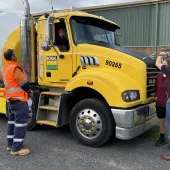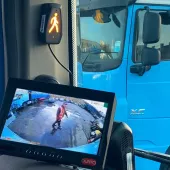MPA Cycle Safe Campaign

Safeguarding Vulnerable Road User training gains momentum with more than 600 drivers completing the course
Improving the sector’s health and safety performance is the top priority for the Mineral Products Association. The MPA is now extending its focus on health and safety to embrace those who come into contact with the industry beyond the site itself. This is the objective behind the MPA’s Cycle Safe campaign, launched in June 2011, which aims to prevent collisions between cyclists and large goods vehicles (LGVs) by raising awareness, on both sides, of how to cycle and drive as safely as possible. The campaign is underpinned by a six-point action plan to:
- Promote driver and industry awareness.
- Promote cyclist and public awareness.
- Improve driver training.
- Encourage MPA members to use appropriate technological adaptations to minimize risks to cyclists and to exchange experience.
- Liaise with schools.
- Work in partnership.
The MPA has been working on all six areas, with more activities in the pipeline for 2013. However, a major milestone was reached in October 2012 when the Association launched its Safeguarding Vulnerable Road User Safety Policy at a National Cycle Safe Event at Hyde Park Corner, in London. The event was held in partnership with the All Party Parliamentary Cycling Group (APPCG) and Transport Minister Stephen Hammond participated and offered his praise and support. A meeting in the House of Commons on cyclist safety followed, with the Minister and a range of stakeholders taking part. The launch event and the MPA’s campaign were covered by ITV1 and BBC Radio.
The MPA’s Safeguarding Vulnerable Road User Safety Policy has three key elements:
- All industry drivers must receive ‘safeguarding vulnerable road user’ training. The industry training body (MPQC) has developed a specific course which has been CPC approved and is now available.
- New industry LGVs must be fitted with additional safety equipment, including blind-spot elimination devices, side under-run guards, class-VI mirrors, audible left-turn warnings for cyclists and pedestrians, and rear warning signs.
- Existing industry LGVs must be fitted with similar equipment levels within an extended five-year period, with operators encouraged to consider accelerating this timing.
Companies are already taking action in line with the MPA’s requirements for safety equipment; and there has been good uptake of the MPQC Safeguarding Vulnerable Road User training module, with more than 600 drivers attending to date.
MPQC Safeguarding Vulnerable Road User course
The course for drivers covers a wide range of topics relating to vulnerable road users and is aimed at changing perceptions and developing a responsible attitude towards these groups.
The course covers the following subject areas:
- Who are the vulnerable road users?
- Road safety initiatives
- Consequences of a fatality
- Driver awareness
- Vehicle checks
- Vehicle specification
- Hazard awareness
- Defensive driving
It can be delivered at a company’s premises or on an open public course basis. The training lasts one day (7h) and is an interactive JAUPT-approved CPC course comprising presentations, group discussions, exercises, DVD clips and case studies.
Following the seven hours CPC and successful achievement of a multiple-choice assessment, attendees receive an updated MPQC Drivers Skills Card which details courses attended on the reverse of the card.
Feedback has been extremely encouraging and trainers delivering the course have been pleased with how positively the course has been received by delegates. Incidents involving cyclists and LGVs are an emotive subject and the course sometimes prompts lively debate, but most people recognize the seriousness of the subject and the proactive measures taken by the indstry to address this through a balanced approach to the training.
The MPA’s chief executive, Nigel Jackson, said: ‘Our sector takes its health and safety ambition seriously and is leading the way on protecting vulnerable road users. MPA policy requires new lorries to be equipped with a range of safety equipment along with retrofitting of the existing fleet.
‘This latest leap forward in driver training is another important development and shows that the sector is behaving responsibly. It is essential that all road users play their part.’
For further information on taking part in the Safeguarding Vulnerable Road User training, call Maggi Pelling at MPQC Skills Centre on tel: (0115) 983 6580; email: maggi.pelling@mpskills.co.uk; or visit: www.mp-qc.org








